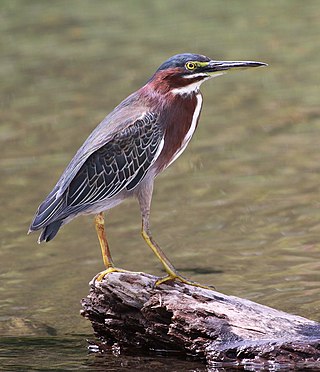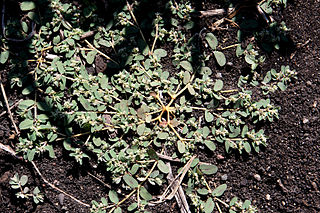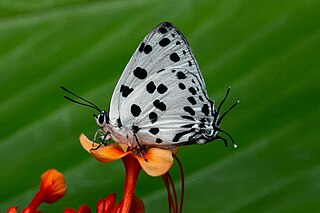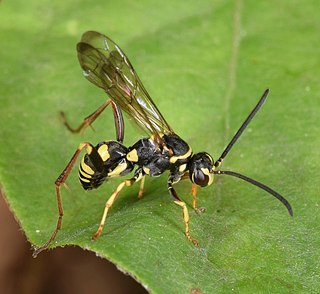
Dactylorhiza maculata subsp. fuchsii, the common spotted orchid, is a subspecies of flowering plant in the orchid family Orchidaceae.

The green heron is a small heron of North and Central America. Butorides is from Middle English butor "bittern" and Ancient Greek -oides, "resembling", and virescens is Latin for "greenish".

Uropeltis maculata, also known commonly as the spotted earth snake and the spotted shieldtail, is a species of nonvenomous snake in the family Uropeltidae. The species is endemic to southern India. There are no subspecies that are recognized as being valid.

Euphorbia maculata, known as spotted spurge, prostrate spurge, milk purslane, or spotted sandmat, is a fast-growing annual plant in the family Euphorbiaceae. While it is native to North America, where it is a common garden and lawn weed in the United States, it has become a common introduced species throughout the world, including Europe, Japan, Korea, Australia, and New Zealand.

The spotted houndshark is a houndshark of the family Triakidae found in tropical waters in the eastern Pacific Ocean off the coast of South America. It usually grows to a length around 180 centimetres (71 in). The reproduction of this houndshark is ovoviviparous, with a litter of 14 pups being found in one female with a birth size of 30 to 40 centimetres. Their diet is believed to consist mainly of crustaceans.

Tajuria maculata, the spotted royal, is a species of lycaenid or blue butterfly found in Asia.

Corymbia maculata, commonly known as spotted gum, is a species of medium-sized to tall tree that is endemic to eastern Australia. It has smooth, mottled bark, lance-shaped to curved adult leaves, flower buds usually in groups of three, white flowers and urn-shaped or barrel-shaped fruit.

The Oʻahu ʻalauahio, also known as the Oʻahu creeper, is a small finch-like Hawaiian honeycreeper that is endemic to the Hawaiian island of Oahu. It is Critically endangered.

Dactylorhiza maculata, known as the heath spotted-orchid or moorland spotted orchid, is an herbaceous perennial plant of the family Orchidaceae. It is widespread in mountainous regions across much of Europe from Portugal and Iceland east to Russia. It is also found in Algeria, Morocco, and western Siberia.

The ebony jewelwing is a species of broad-winged damselfly. One of about 150 species of Calopterygidae, it is found in the eastern U.S. and southeastern Canada, ranging west to the Great Plains. Other common names include black-winged damselfly.

Woodworthia maculata, also known as the New Zealand common gecko or Raukawa gecko, is a species in the family Diplodactylidae. The species is endemic to New Zealand.

Ixia maculata is a species of flowering plant in the family Iridaceae known by the common name spotted African corn lily. It is native to the Cape Provinces of South Africa, but it is grown widely as an ornamental plant. It can also be found growing wild as an introduced species in several areas, including Western Australia. This perennial flower grows 20 to 70 centimeters tall with an erect, unbranched stem. There are a few twisting basal leaves up to 35 centimeters long. The inflorescence is a dense, showy spike of up to 12 flowers, usually orange to yellow in color, sometimes with areas of purple or red and often with spots; the coloration in garden plants varies due to breeding.

The blotched snakehead is a species of snakehead. It is one of four species of the genus Channa native to China. It is also native to northern Vietnam and Taiwan, but has been widely introduced to other countries, where it is an invasive species. This predatory species typically grows to a length of 20–30 cm (7.9–11.8 in), but it has been confirmed at 33 cm (13 in) and some suggest it may reach a far larger size.

Ceropales maculata is a kleptoparasitic spider wasp found in the holoarctic region.

Thyris maculata, the spotted thyris, is a species of window-winged moth in the family Thyrididae.
Dicranota maculata is a species of hairy-eyed crane fly in the family Pediciidae.
Tytthotyle is a genus of furnace heat lubbers in the family Romaleidae. There is at least one described species in Tytthotyle, T. maculata.
Itolia is a genus of robber flies in the family Asilidae. There are about five described species in Itolia.
Cionopsis maculata is a species of true weevil in the beetle family Curculionidae. It is found in North America.
Epicauta maculata, the spotted blister beetle, is a species of blister beetle in the family Meloidae. It is found in Central America and North America.















